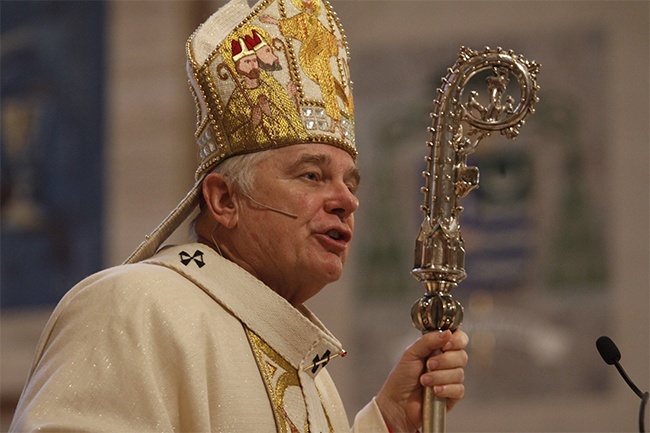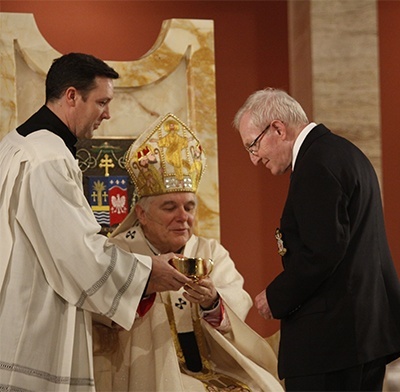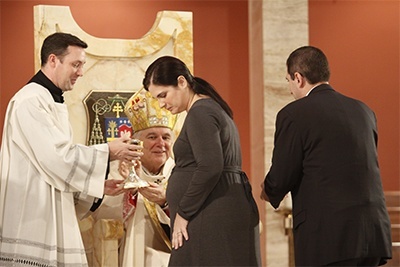By Archbishop Thomas Wenski - The Archdiocese of Miami

Photographer: ANA RODRIGUEZ-SOTO | FC
Archbishop Thomas Wenski preaches the homily at the Thanks4Giving Mass.
Archbishop Thomas Wenski preached this homily Nov. 24 at St. Mary Cathedral, during the annual Thanks4Giving Mass to honor those who contribute to the ABCD � Archbishop�s Charities and Development appeal.
Today, the last Sunday of the liturgical year, we celebrate the solemnity of Christ the King � and later this week, we will gather with family and loved ones to observe a great national holiday, Thanksgiving. In Rome earlier this morning, Pope Francis solemnly closed the Year of Faith which was convoked by Pope Benedict to commemorate the 50th anniversary of the beginning of the Second Vatican Council.
These are all reasons to bring together to the cathedral this morning parishioners from all across the archdiocese. Many of you participated in one way or another in our Synod and all of you have supported your parishes and this archdiocese in many ways including our annual Archbishop�s Charity and Development campaign, the ABCD. If Thursday is �Thanksgiving Day,� today is the Archdiocese�s �Thanks-for-giving Day.�
 As Archbishop I am grateful to you because through your support of the ABCD, we as a Catholic community in South Florida are truly �one in faith, one in hope, and one in charity.�
As Archbishop I am grateful to you because through your support of the ABCD, we as a Catholic community in South Florida are truly �one in faith, one in hope, and one in charity.�
One of the central teachings of the Second Vatican Council is that the human person can only realize himself as a human being through the sincere gift of himself or herself. True human fulfillment, true happiness, is not found through self seeking or self assertion but through self giving. And this gift of self is modeled for us by our Lord Jesus Christ � who gives himself to the Father for us on the cross. Again, thank you for giving.
As I said, today we celebrate the solemnity of Christ the King. At first glance, since today we are not governed by kings, we might be tempted to regard such a feast as an anachronistic relic of a long past era. The only kings most of us have heard about are the king of diamonds, the king of hearts, the king of clubs and the king of spades. Yet the solemnity of Christ the King � as a liturgical institution � is actually quite recent. It was established not by some medieval pope but by a quite modern day one, Pope Pius XI in 1925.
The pope was not engaging in some flight of fantasy; in fact, by adding the feast of Christ the King to the liturgical calendar he wanted to put his thumb in the eye of a world which had already begun to pretend that it could organize itself without God. The October Revolution of 1917 in Russia had already been consolidated and with it, under the spell of radical secular ideologies of both the right and the left, the 20th century was well on its way to becoming the most violent, the most murderous in history. Whenever and wherever the human race seeks to organize itself without God or against God, confusion is sown � and the harvest is hatred, distrust, violence. Pope Benedict has spoken frequently about the threat of secularism in our modern world. Secularism, he says, is the process of organizing society or living one�s life as if God does not matter � etsi Deus non daretur. And where God does not matter, nothing much else will matter either.
 This was the climate in which this feast was born � and perhaps what motivated the pope to establish this feast was revolution in Mexico. There, a revolutionary government was established which persecuted the Church � and not just bishops and priests, but the entire community of the baptized � with a ferocity that paralleled what was already happening in Soviet Russia. There in Mexico, thousands were killed in the name of freeing people from religious �superstition.�
This was the climate in which this feast was born � and perhaps what motivated the pope to establish this feast was revolution in Mexico. There, a revolutionary government was established which persecuted the Church � and not just bishops and priests, but the entire community of the baptized � with a ferocity that paralleled what was already happening in Soviet Russia. There in Mexico, thousands were killed in the name of freeing people from religious �superstition.�
Led before firing squads, many died shouting: �Long live Christ the King,� Viva Cristo Rey! Yesterday, November 23rd, was the feast day of one of these Mexican martyrs, a Jesuit priest, Father Miguel Pro. These martyrs and the millions who died in the successive holocausts of the 20th century remind us that when we pretend to organize the world without reference to God and his truth, we end up organizing the world against man himself.
While the establishment of the feast is recent, the content of what we celebrate today is indeed quite old � indeed it is as old as Christianity. To say that �Christ reigns� is the equivalent of what we say in our profession of faith: �Jesus is Lord.�
And so when many thought that God should be exiled from the affairs of the world � or at least marginalized to the point where he didn�t really matter � Pope Pius XI in establishing this feast day wished to remind us that Jesus is the world�s true ruler and judge.
The Gospel reading chosen for today�s feast is that of the death of Christ because it was at that moment that Christ began to rule over the world. The cross is the throne of this king. He is robed not in majesty but in mercy � and, even as he hung on the cross some of his followers (and even his enemies) still expected some sort of spectacular manifestation of his kingship. And he revealed it not by coming down from the cross but by saying to one man � and a criminal at that: �Truly, I say to you, today you will be with me in Paradise.� Not majesty but mercy; not pomp and circumstance but poverty; not power but passion. These are the attributes of our King and Lord who will judge us and our history.
According to St. Paul, there are two possible ways of living: �either for oneself or for the Lord� (cf. Romans 14: 7-9). To live �for oneself� means to live as if one has in oneself one�s own beginning and one�s own end. It indicates an existence shut-in on itself, oriented only to one�s own satisfaction and glory, without any prospect of eternity. Today, we can see individuals and indeed whole societies of people who have opted to live for �themselves.�
But this living for oneself creates a barren, lifeless world marked by a confusion of tongues where words like love and marriage lose their proper meanings. Living for oneself leads to a dead end of despair � a despair reflected in the social ills of our time � in reality, poverty, drug abuse, abortion, promiscuity, the breakup of the family are symptomatic of a world bereft of hope.
Pope Francis when he visited the poor farmers of Sardinia, the unemployed youth of the favelas of Rio, and the shipwrecked African refugees at Lampedusa has told them: �Don�t let yourselves be robbed of hope.� And he says to each one of us, �We need Christians who make God�s mercy and tenderness to every creature visible to the men of our day.� And you do make God�s mercy and tenderness visible in the gift of yourselves. And this self-gift is reflected in your generosity to the ABCD which supports so many life changing and life affirming ministries, ministries which exist to reintroduce hope into our world.
But, faced with so much pressure to live for oneself � to think that it is all about me, me, me � we do well at the end of our liturgical year to remind ourselves that Jesus is indeed Lord � and to live for him, �for the Lord,� means to live in view of him, for his glory, for his kingdom.
The moment of death�s seeming triumph over Jesus on the cross was in fact its defeat.
Jesus� kingship is really about a new existence � the new existence promised to the repentant thief � and to us. The greatest contradiction, which man has always experienced � that between life and death � has been overcome. The most radical contradiction is no longer between �living� and �dying� but between living �for oneself� and living �for the Lord.�
Today we gather once again around the altar to celebrate that new existence of grace. The Lord gives himself to us in the communion of his Body and Blood so that we might give ourselves to him and to one another. It is that grace which explains why for over two millennia, the martyrs could face their persecutors � and like Padre Miguel Pro of Mexico could cry out with faith: Viva Cristo Rey! Long live Christ the King. With that same grace may we too acclaim him as our King � in word and in deed by making our lives a gift for him and for others.
Today, the last Sunday of the liturgical year, we celebrate the solemnity of Christ the King � and later this week, we will gather with family and loved ones to observe a great national holiday, Thanksgiving. In Rome earlier this morning, Pope Francis solemnly closed the Year of Faith which was convoked by Pope Benedict to commemorate the 50th anniversary of the beginning of the Second Vatican Council.
These are all reasons to bring together to the cathedral this morning parishioners from all across the archdiocese. Many of you participated in one way or another in our Synod and all of you have supported your parishes and this archdiocese in many ways including our annual Archbishop�s Charity and Development campaign, the ABCD. If Thursday is �Thanksgiving Day,� today is the Archdiocese�s �Thanks-for-giving Day.�

Photographer: ANA RODRIGUEZ-SOTO | FC
John Dietl of St. Maximilian Kolbe Parish in Pembroke Pines takes up the offertory during the Thanks4Giving Mass.
One of the central teachings of the Second Vatican Council is that the human person can only realize himself as a human being through the sincere gift of himself or herself. True human fulfillment, true happiness, is not found through self seeking or self assertion but through self giving. And this gift of self is modeled for us by our Lord Jesus Christ � who gives himself to the Father for us on the cross. Again, thank you for giving.
As I said, today we celebrate the solemnity of Christ the King. At first glance, since today we are not governed by kings, we might be tempted to regard such a feast as an anachronistic relic of a long past era. The only kings most of us have heard about are the king of diamonds, the king of hearts, the king of clubs and the king of spades. Yet the solemnity of Christ the King � as a liturgical institution � is actually quite recent. It was established not by some medieval pope but by a quite modern day one, Pope Pius XI in 1925.
The pope was not engaging in some flight of fantasy; in fact, by adding the feast of Christ the King to the liturgical calendar he wanted to put his thumb in the eye of a world which had already begun to pretend that it could organize itself without God. The October Revolution of 1917 in Russia had already been consolidated and with it, under the spell of radical secular ideologies of both the right and the left, the 20th century was well on its way to becoming the most violent, the most murderous in history. Whenever and wherever the human race seeks to organize itself without God or against God, confusion is sown � and the harvest is hatred, distrust, violence. Pope Benedict has spoken frequently about the threat of secularism in our modern world. Secularism, he says, is the process of organizing society or living one�s life as if God does not matter � etsi Deus non daretur. And where God does not matter, nothing much else will matter either.

Photographer: ANA RODRIGUEZ-SOTO | FC
Lenore and Sergio Rodicio of St. Michael Parish take up the offertory during the Thanks4Giving Mass.
Led before firing squads, many died shouting: �Long live Christ the King,� Viva Cristo Rey! Yesterday, November 23rd, was the feast day of one of these Mexican martyrs, a Jesuit priest, Father Miguel Pro. These martyrs and the millions who died in the successive holocausts of the 20th century remind us that when we pretend to organize the world without reference to God and his truth, we end up organizing the world against man himself.
While the establishment of the feast is recent, the content of what we celebrate today is indeed quite old � indeed it is as old as Christianity. To say that �Christ reigns� is the equivalent of what we say in our profession of faith: �Jesus is Lord.�
And so when many thought that God should be exiled from the affairs of the world � or at least marginalized to the point where he didn�t really matter � Pope Pius XI in establishing this feast day wished to remind us that Jesus is the world�s true ruler and judge.
The Gospel reading chosen for today�s feast is that of the death of Christ because it was at that moment that Christ began to rule over the world. The cross is the throne of this king. He is robed not in majesty but in mercy � and, even as he hung on the cross some of his followers (and even his enemies) still expected some sort of spectacular manifestation of his kingship. And he revealed it not by coming down from the cross but by saying to one man � and a criminal at that: �Truly, I say to you, today you will be with me in Paradise.� Not majesty but mercy; not pomp and circumstance but poverty; not power but passion. These are the attributes of our King and Lord who will judge us and our history.
According to St. Paul, there are two possible ways of living: �either for oneself or for the Lord� (cf. Romans 14: 7-9). To live �for oneself� means to live as if one has in oneself one�s own beginning and one�s own end. It indicates an existence shut-in on itself, oriented only to one�s own satisfaction and glory, without any prospect of eternity. Today, we can see individuals and indeed whole societies of people who have opted to live for �themselves.�
But this living for oneself creates a barren, lifeless world marked by a confusion of tongues where words like love and marriage lose their proper meanings. Living for oneself leads to a dead end of despair � a despair reflected in the social ills of our time � in reality, poverty, drug abuse, abortion, promiscuity, the breakup of the family are symptomatic of a world bereft of hope.
Pope Francis when he visited the poor farmers of Sardinia, the unemployed youth of the favelas of Rio, and the shipwrecked African refugees at Lampedusa has told them: �Don�t let yourselves be robbed of hope.� And he says to each one of us, �We need Christians who make God�s mercy and tenderness to every creature visible to the men of our day.� And you do make God�s mercy and tenderness visible in the gift of yourselves. And this self-gift is reflected in your generosity to the ABCD which supports so many life changing and life affirming ministries, ministries which exist to reintroduce hope into our world.
But, faced with so much pressure to live for oneself � to think that it is all about me, me, me � we do well at the end of our liturgical year to remind ourselves that Jesus is indeed Lord � and to live for him, �for the Lord,� means to live in view of him, for his glory, for his kingdom.
The moment of death�s seeming triumph over Jesus on the cross was in fact its defeat.
Jesus� kingship is really about a new existence � the new existence promised to the repentant thief � and to us. The greatest contradiction, which man has always experienced � that between life and death � has been overcome. The most radical contradiction is no longer between �living� and �dying� but between living �for oneself� and living �for the Lord.�
Today we gather once again around the altar to celebrate that new existence of grace. The Lord gives himself to us in the communion of his Body and Blood so that we might give ourselves to him and to one another. It is that grace which explains why for over two millennia, the martyrs could face their persecutors � and like Padre Miguel Pro of Mexico could cry out with faith: Viva Cristo Rey! Long live Christ the King. With that same grace may we too acclaim him as our King � in word and in deed by making our lives a gift for him and for others.

